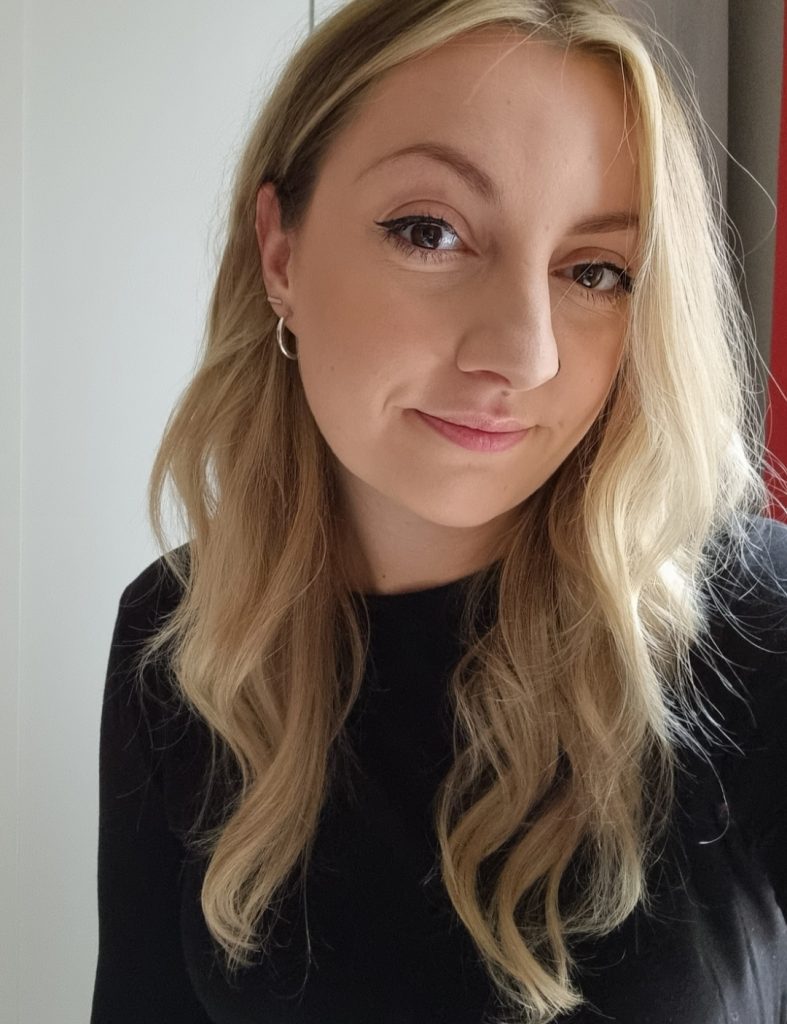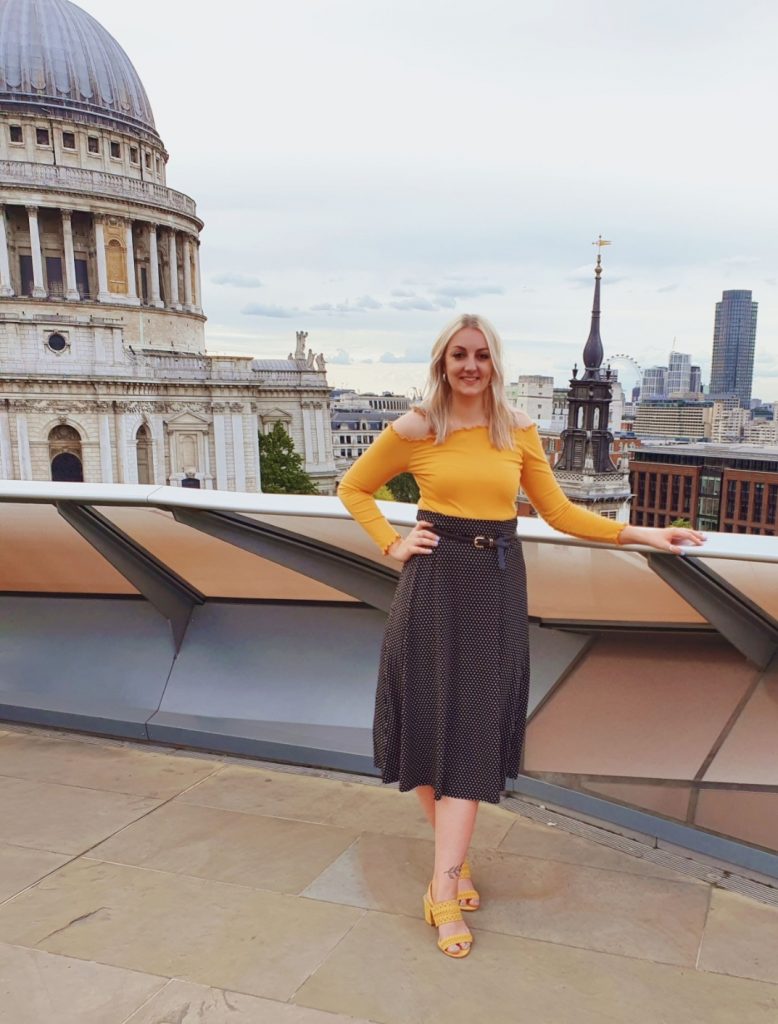Bethany
Next in our ongoing series of ‘Your Behçet’s Stories’, we heard from Bethany who shared her experiences of having Behçet’s symptoms since she was very young, how her Behçet’s mostly affects her eyes, and how crafting and jogging help her to manage her wellbeing. Thank you to Bethany for sharing your story! If you’d like to take part in the series too, all the details are at the bottom of the page.
Bethany lives in Sussex with her fiancé and pet hamster, and was diagnosed with Behçet’s in her teens. She works from home and enjoys travel, various crafts and going for the odd jog in her spare time.
How old were you when your Behçet’s symptoms started and how did you eventually get diagnosed?
I have suffered with chronic mouth ulcers since I was a young child. I can remember being in tears at school with my mouth full of them, barely able to talk. I’ve always had achy joints and hives on my skin which I just thought were normal for me. After returning from a charity trip to The Gambia when I was 17, I had a particularly bad outbreak of mouth ulcers, which we put down to a side effect of malaria tablets. I then noticed I had extremely blurry vision in my left eye (I hadn’t had any eye problems before, and didn’t even wear glasses) so booked an eye test. The room went very quiet during the eye examination, and then the optician said “I’m going to urgently refer you to the hospital.” He thought he’d seen evidence of some sort of bleed or other unexplained major eye trauma due to the very high levels of inflammation in my eye. I was seen in the eye department the next day, so I knew it was serious.
Diagnosis took years and still isn’t 100% certain. I don’t have all the typical Behçet’s symptoms and for a long time my eye issues were classed as idiopathic. As the timing had coincided with coming back from Africa, a lot of tropical diseases and even parasites were potentially considered as to why I was suddenly rapidly losing my eyesight. I had numerous brain scans, blood tests and eye scans and no one could work out what was happening to me. The turning point was when an amazing ophthalmologist at Eastbourne hospital, Mr Kashani, took over my care and really pushed to get me a diagnosis and treatment. I firmly believe I wouldn’t have my eyesight today if it wasn’t for him taking over my care. I owe him a lot.
Having symptoms at a young age must have been extremely difficult. How did it affect you as you were growing up? Were your teachers and school friends understanding of your condition?
My symptoms started during my time in Sixth Form college and I ended up with a very poor attendance record. I did my best to stay up to date with my work and left with great grades, but I was also suffering with anxiety and mild agoraphobia due to how long I’d spent at home ill.
I was at university during the most trying part of my illness and they were great. There was lots of support. My tutor researched the condition to understand it fully and I got deadline extensions when I was flaring. It did mean I missed out on some of the typical ‘university experiences’ though, especially spending Freshers’ week sober (as alcohol was a non-no on my treatment at the time!). I spent a lot of time coming back and forth from university for infusions and appointments and it was difficult, but on the whole I loved my time at university and met great friends who were very understanding.
When I was younger, I was somewhat reluctant to tell people my diagnosis because when you look up Behçet’s, there’s a lot online about the genital ulcers (which I don’t suffer with) and I was embarrassed to share this with my friends, which is silly in hindsight, but I was shy and thought people would judge me. Now I am older I am proud to tell people what I have lived through, and happily explain about the condition so people are aware. I love meeting new GPs or nurses who don’t know about the condition so I can give them a mini lesson on it!
You mentioned to us that your Behçet’s mostly affects your eyes and that you’ve been the first patient at Sussex Eye Hospital to receive Interferon for them. How is your treatment going?
I’ve been on interferon for a while now and it’s working really well for my symptoms! I haven’t had any eye flares whilst on it and although it’s a self-injection which I was unsure about to start with, I am very used to doing it now. When I first started interferon it was very tough – the loading dose was intense and the side effects made me feel very ill with awfully debilitating flu-like symptoms, but since switching to a pegylated version, the side effects are minimal now.
We tried weaning me off interferon in March 2021, as it’s not intended to be a long term medication, but sadly it had not altered my immune response and my eyes flared within a month of weaning off. So for the time being, I am continuing with it as my main treatment.
I think the only downside is it is believed to have affected my thyroid function so I now have to take thyroid medication to level that out, but I think that’s a small price to pay for my eyesight!
What have you found to be the most difficult thing about having Behçet’s?
The uncertainty of diagnosis, treatment options, and symptoms, which are so far ranging I never know whether to attribute something to Behçet’s or something else. I think I would find it much more difficult if I didn’t have such an amazingly dedicated medical team though. They make it their priority to look after me and I feel extremely confident in their safe hands.
It’s also still not a well-known condition so it can be a struggle explaining it to new doctors. When I was admitted to hospital with COVID for example, none of the A&E doctors were familiar with it as a condition and trying to explain it whilst on my own, feverish and suffering with a pulmonary embolism was very difficult.
How are you doing now in your recovery from COVID-19?
I definitely did have long COVID symptoms for a while, and had some lung scarring which made walking longer distances a bit of a struggle. I was hospitalised due to a pulmonary embolism, which just shows how dangerous COVID can be (this was pre-vaccines).
Afterwards I mainly struggled mentally with the after effects of being on the COVID ward. It was a really harrowing time, I spent three days locked in a room with no personal belongings, a very high fever so I was seeing things, no contact with other people and the knowledge that there were others sadly passing away across the hallway from me. I had a lot of nightmares recalling my time on the ward and had to work on my mental health afterwards, but I am much better now!
You mentioned that you post on your social media about your Behçet’s. Do you find social media very helpful for finding support?
I do! I don’t have a specific page for my illness but I have an Instagram account dedicated to showing my art and craft endeavours and I don’t shy away from posting about my condition. I think it’s important for people to know that everyone they follow online has their own personal struggles and you never know what someone is going through behind closed doors.
There is also a great private Facebook group for those of us in the UK with Behçet’s which is full of lovely people and we all support each other with advice, empathy and a place to vent if needed. It’s been invaluable in terms of asking others about certain symptoms and sharing frustrations with other people who ‘get it’.
In terms of your wellbeing, is there anything that particularly helps you?
I personally find crafting really helps me. It’s a distraction when I feel unwell and something that brings me joy. When I was stuck in bed during the interferon loading dose I pursued embroidery, and during the shielding period where I was bored silly inside I crocheted many blankets!
I have also started Couch to 5k and whilst I can only jog for short distances, I find getting out in the fresh air really helps me and I have noticed an improvement in my joints when I move regularly. I am lucky though that my symptoms are well controlled as I would not have been able to do this a few years ago when my disease was more active.
I also have a super supportive family who are invaluable. My mum and fiancé are amazing and ferry me around to all of my appointments. I have found it difficult during the pandemic not being able to have them with me in hospital appointments, as I would normally take them in with me as another set of ears and support if I need it.
Do you have any tips for other Behçet’s patients for managing symptoms and flare-ups?
The main thing I always stress is to get symptoms (especially eye ones) checked out straight away. Eye symptoms need looking at by the appropriate medical professional and time is of the essence so anything unusual, don’t ignore it! It’s always better to be safe than sorry.
I would also say seek a second opinion if possible if you aren’t happy with the care you are receiving. I have an amazing team now but some of the initial medical professionals I met were very nice but weren’t clued up on Behçet’s enough for me to find the care sufficient. We pushed for my care to be taken seriously and I ended up with a wonderful team behind me.
Other than that, it’s difficult but I do try to keep a positive mental attitude. When my symptoms were really bad I had a phrase I kept in my mind at all times, “if you’re going through hell, keep going”, and I think that’s all we can do – keep going, and things will improve.
Thank you very much to Bethany for answering our questions!
Interview published 03/02/22
Could your story help others?
We would like to share your personal experiences of diagnosis and living with Behçet’s, and we’d like to hear from a wide variety of patients, of all ages and backgrounds. We’d also like to hear from carers and/or family members of those affected by the condition.
If you’re a patient you might have some particular tips for managing your condition day-to-day that you would like to share to help others, or you might simply like to tell us your story of diagnosis or about a recent fundraising event you’ve been involved in. If you’re a carer or family member of someone affected by Behçet’s, you might wish to share your personal experiences of caring for someone with a rare condition. You can share as much or as little as you want with us.
If you are interested in taking part and would like to know more please email Deborah at info@behcetsuk.org
We look forward to hearing from you!


